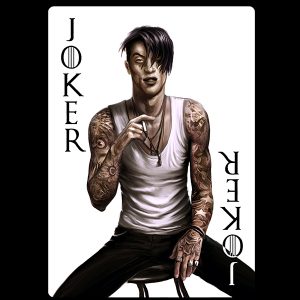How to Write Great Antagonists – Three Tips

How to write great ones.
Can I just say, I LOVE antagonists.
They don’t carry the major weight of the plot and therefore can be a little crazy, weird, or just plain ass jerks. And since readers don’t have to like, or side with the antagonist…at least not right away…you can have mucho fun with their personalities.
Because a story without a juicy antagonist will be Boring, with a capital B!
But never forget antagonists need an arc too.
Yes, they are sh** disturbers and need to create friction, but their development in the story is critical for the hero’s journey and a satisfying ending.
In my second novel, A Rainbow Like You, the story is set against the backdrop of a touring rock band. Adrian ‘Jazzer’ Johnson is the hero and lead singer of the band. The antagonist is Norman Hunger (pictured above.) He’s the hot mess bass player constantly at odds with Adrian. The rising friction between them forces Adrian to make drastic choices and keeps the drama flowing.
How did I bring Norm to life?
Here are my three tips for writing a great antagonist:
OPPOSING PERSONALITIES
They say opposites attract, but in the long run, personality differences create problems. The clash of hero and antagonist will be that much greater if, at their core, they are two very different people.
In A Rainbow Like You, Adrian is driven, private and likes to be in control. Norm is a bon vivant, an insouciant rebel with diva tendencies. Even on paper, it’s obvious these guys are polar opposites. Put them together in the potboiler environment of being on tour and voila…fireworks.
But personality differences are only one element.
DIFFERENT GOALS
Tension also arises when characters have different goals. Adrian’s main goal of being a musician is to satisfy a need inside himself to create songs; the fame game is not what he signed up for. Norm on the other hand, relishes the spotlight, and all the trappings that come with being in a popular band.
Eventually, these two opposing goals will spell trouble.
Which leads into the final tip on writing juicy antagonists…
THEY MUST PUSH THE HERO
Aside from creating tension, the antagonist’s ultimate purpose in a story is to push the hero. And they do this by either 1) holding up a proverbial mirror so the hero can see their own flaws and adjust; 2) needling the hero into making a decision (good or bad) or 3) in the case of a villain, forcing the hero to dig deep and figure out a way to defeat them.
In summary, if your hero is on the path to redemption, a higher calling, or a journey of self discovery, the antagonist is a major pot hole on the road your hero travels on.
Make them memorable!
*****
If you’d like to watch the video on this topic, find it HERE.
Bonus content includes a breakdown of a great antagonist, Erlich, from the hit TV show “Silicon Valley.”


